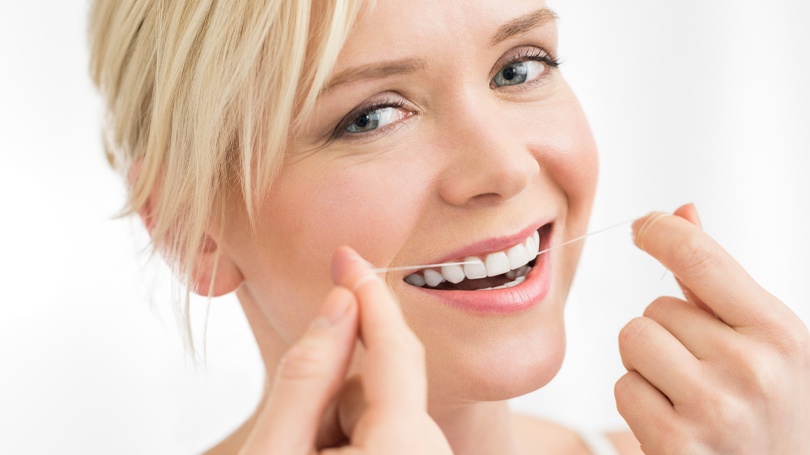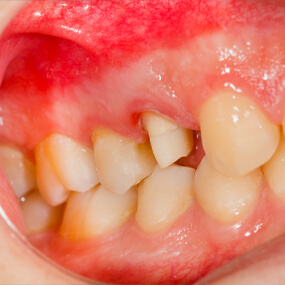Five Reasons Flossing Is Essential to Tooth and Gum Health

The American Dental Association (ADA) recommendation is that you brush your teeth twice a day and floss once daily. Most people adhere to the brushing advice, but flossing can seem like a hassle and is easy to put off. In fact, flossing gets skipped by many people far more often than it should.
While brushing cleans the exposed surfaces of the teeth, it is not well-suited to cleaning between the teeth and between the teeth and gums. Flossing, on the other hand, is an interdental technique. It can get into those tight spaces between the teeth and gums. Even a therapeutic mouthwash, which may feel like it gets in between the teeth, cannot dislodge stubborn food particles and plaque.
It takes plaque about 24 hours to form, which is the basis for the once-daily recommendation from the ADA. Just as with brushing, the core purpose of flossing is to avoid and remove plaque, prevent plaque from hardening into dental calculus—or tartar—and to control this situation in your mouth until the next time you visit your dentist and can have your teeth professionally cleaned.
Failure to keep this situation under control can lead to gum disease, tooth decay, and halitosis. Left unchecked, gingivitis can develop into the more advanced periodontitis. Tooth loss can occur, and the infections and inflammation in your mouth can lead to and exacerbate a wide range of issues throughout your body, including diabetes, heart disease, and kidney disease.
Here Are the Top Five Reasons Daily Flossing Is So Important:
1. Flossing Plus Brushing Removes More Plaque Than Just Brushing
Many people brush at least twice a day and, because of this, rationalize that flossing is really unnecessary. But there is a great deal of scientific evidence to the contrary. You can brush twice daily, but if you do not floss, there is a good chance that your dental hygienist will be scraping away tartar during your next session.
Plague is a sticky substance the forms due to a reaction with bacteria in your mouth. When you brush, you physically remove that substance. Soft-bristled brushes are preferred, and a gentle brushing motion is more than enough. You actually do not need toothpaste for the plaque removal itself, and some dentists even recommend starting with a wet brush and then adding the toothpaste towards the end. The toothpaste does contain fluoride, which kills bacteria and strengthens your teeth.
As mentioned in the opener, neither your brush nor the toothpaste you use can get in between the teeth or where the gums overlap the teeth. Floss, however, is highly effective in this regard. The ADA recommends flossing then brushing as the most effective approach. It can help to make it a ritual. Each night before you go to bed, for instance, floss your teeth and then brush your teeth.
2. Flossing Helps Prevent Gum Disease
To appreciate what floss does, it helps to picture the interworking of your teeth, gums, and jawbone. Your teeth are attached to your upper and lower jaw via roots. The bones and teeth roots are covered by soft tissue—your gums. The place where your gums and teeth meet is highly susceptible to plaque formation, and it is not an area easily reached when brushing your teeth.
Tiny food particles get between the gums and teeth. Those particles create bacteria that will eventually become plaque and harden into calculus. Calculus is generally not removable at home and must be cleaned professionally. It leads to gingivitis, which is the first stage of gum disease. Its symptoms include red, swollen gums and gums that bleed easily. Untreated, plaque and calculus can continue to accumulate deeper and deeper below the gumline and eventually cause periodontitis.
Flossing is the only at-home technique we have at our disposal to reach these places and avoid accumulation. Your dentist and dental hygienist can help, but a great deal of harmful plaque and tartar can build up in the six months or even year between your last visit and the next.
3. Flossing Reduces Your Dental Care Costs
Preventative oral hygiene protects your mouth—and your wallet too. Your goal should be to limit the dental care you require to a regular examination and cleaning. That is how you minimize your dental expenses, and if you are fortunate enough to have insurance, you may pay less out of pocket.
The Children’s Dental Health Project conducted an interesting study in which it compared the total dental costs of two groups. The first group had visited a pediatric dentist by the age of 1. The second group did not visit a dentist until some time after that point. By age 5, the dental costs of the second group were 40 percent higher than the expenses incurred by the first group.
Other research has shown that many adults tend to be reactive rather than proactive when it comes to their dental care. Since their teeth and gums look and feel fine, they skip regular visits and only book an appointment when a problem manifests. Sometimes, that means a trip to the emergency room. That can increase costs by 10 percent right off the bat, but it can actually be much more since root canal therapy, for instance, is far more expensive than several years of regular checkups and cleanings.
There are other benefits to visiting your dentist twice a year: patient education and motivation. If you are doing something wrong or doing something else too much or not often enough, your dentist can not only explain this to you but do so in a personalized manner. It is also human nature that you will be more inclined to stick to flossing when you know someone will be assessing that effort in the future.
4. Flossing Can Prevent Many Different Diseases
Not flossing can lead to bad breath, discolored teeth, uncomfortable teeth and gums, tooth decay, gum disease, and so forth, but did you know it can harm the rest of your body as well? The Centers for Disease Control and Prevention has warned that nearly half of Americans age 30 and up have some form of gum disease. Modern research has found that gum disease is more prevalent in people with diabetes, heart disease, respiratory illness, kidney disease, liver disease, and even Alzheimer’s disease.
A recent study found that people with periodontitis were nearly 25 percent more prone to lung cancer even if they had never smoked a cigarette a day in their lives! The link between gum disease and these other health complications is not fully understood. More research is required, but medicine does know enough to recommend preventative oral care as a crucial step in maintaining good overall health.
5. Flossing Daily Prevents Tartar Accumulation
If you have ever had a dentist or dental hygienist scrape away tartar from your teeth, then you know how uncomfortable that procedure can be. Most people who have sat through it once never want to sit through it again. As mentioned, tartar is plaque that has hardened, and it contains all the negatives associated with plaque but without being easily removable from the teeth and from between the teeth and gums.
If you brush twice and floss every day, will you remove 100 percent of the plaque? Most likely not. You will still need to see your dentist twice a year to achieve that. However, what flossing does is disturb the plaque between your teeth and gums. Even the plaque that you miss cannot harden into tartar when it is being disturbed on a regular basis.
This is why the ADA recommends brushing, flossing, toothpaste, and mouthwash. The brushing and flossing provide physical plaque removal. The fluoride toothpaste and therapeutic mouthwash provide the chemical cleaning that reduces bacteria and strengthens tooth enamel.
Win the Battle Against Plaque
It is never too late to turn the tides against the plaque and tartar that has accumulated in your mouth. But the sooner you start, the better. Jeffrey D. Clark, DDS, is a leading dentist who can help you improve and maintain your oral health. Schedule your appointment with Dr. Clark at Scottsdale Cosmetic Dentistry Excellence today, and tonight, before you go to bed, floss those teeth and gums. Call us at 480 585 1853.




